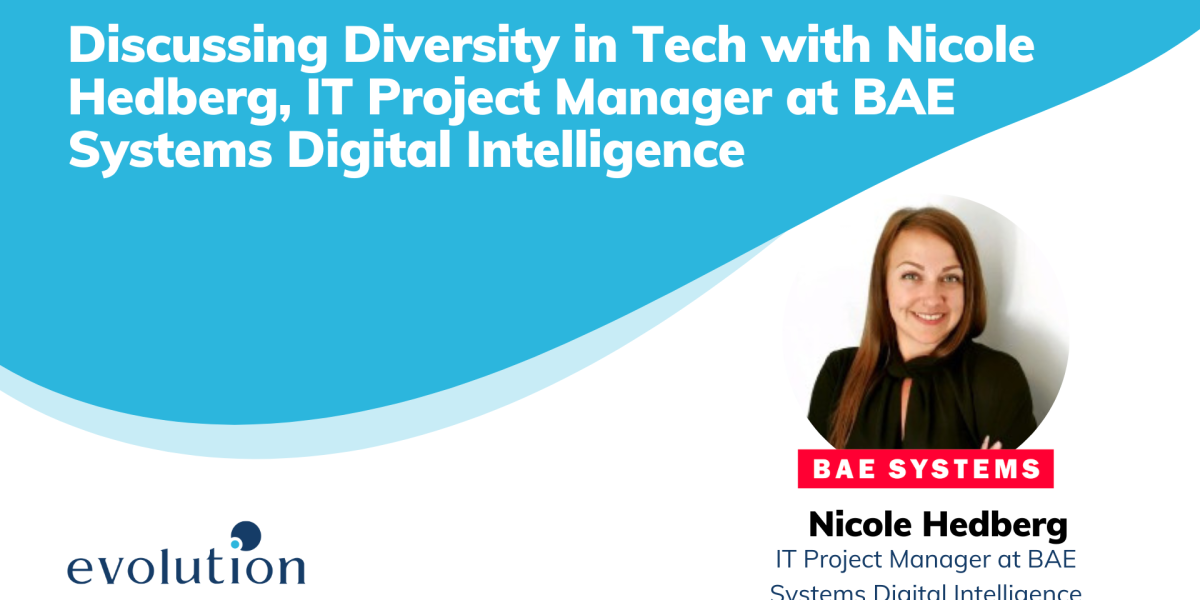
Nicole Hedberg, IT Project Manager at BAE Systems Digital Intelligence, originally from Sweden. She moved to Scotland to study at university, achieving a degree in psychology and a master’s degree in business and management. Upon completion of her studies she applied for a delivery management role at BAE Systems Applied Intelligence.
Although she enjoyed her client facing roles, she wanted to make a more direct impact and it was this that led to her joining the internal IT team.
“I felt a little bit like I was a cog in the wheel. The things we were delivering were so large and my contribution was integral but still such a small part that I didn’t get to see the full impact of what I was doing. An opportunity came up for me to join the IT team internally and I decided to give it a shot. I wanted to feel the impact of my hard work and see the outcome that I contributed to. So I started delivering internal infrastructure and expansion projects to our colleagues.”
In a male-dominated industry such as the one in which Nicole works, women can face some specific challenges.
“There are definitely aspects that are improving however we can always do more and I feel that’s due to systematic gender bias and legacy inequality, and there not being as many female role models as there are male role models. I find that in general women – or actually myself in particular, perhaps have difficulty forming accurate self-assessments, sometimes creating self-doubt. That can lead to a very strong sense of imposter syndrome.”
Imposter syndrome can affect anyone, but is particularly experienced by professional women. The persistent feeling that success isn’t deserved can derail careers and stop people from asking for pay rises or seeking promotion.
The balance between speaking out and being confident, and not wanting to appear over-confident is something that many women struggle to manage, particularly when confidence in women tends to be viewed differently in the workplace to confidence in men.
“If a woman is too outspoken, she can be viewed negatively. Likewise, if you don’t speak up enough, then you’re viewed as a “little girl” at times, especially as a young woman. I’ve definitely experienced imposter syndrome and found that quite challenging at times. I often have to remind myself that I’m here for a reason. Every individual working within these project teams are here because they have a particular skill and as a team we can ensure success. I’m here because I am respected and also contribute to the team, my skills and knowledge are valuable, and they help drive our projects forward.”
Having role models can really help women with these difficulties. Seeing a woman in a position of leadership helps other women feel as though they belong and are worthy of progression. For Nicole, having a woman at the head of her department has been a huge benefit to her.
“As a woman in my late 20s, soon early 30s, I find it’s difficult to relate to a man in his 50s. So having a woman at the head of the department has made things a lot more comfortable, and it’s inspiring.”
Working at BAE Systems Digital Intelligence, Nicole sees more and more women being promoted to leadership positions, and is delighted that more opportunities are being offered to women all of the time.
“We need to keep on giving women the opportunity to rise up and to break our own barriers or own thoughts about what leadership is and what women contribute to in the workplace. The old archaic way of viewing a leader is not true. There are many ways to be a leader. And I think feminine touches are not to be disregarded. It contributes immensely to the team and to the organisations, and makes it a much more pleasurable place to work when we are all one. And when we are all diverse as one.”
One of the ways that more women can be supported into these leadership positions is through mentorship, which Nicole is a huge advocate of. Using mentorship to fill skills gaps and provide practical learning within careers is a big benefit for women.
“I definitely think mentorship and on site learning is a great way to bridge skills gaps, because there’s only so much theoretical information someone can absorb. Creating opportunities for everyone to learn new skills is vital to the success of a business”
Nicole’s advice for those who are following in her footsteps is to embrace not knowing everything – just maintain curiosity and ask questions of everyone.
Don’t be afraid to look “incompetent”, take those fears and those insecurities and throw them out of the window. Because we are all just trying to do our job to the best of our abilities. We are all just trying to develop and we’re all trying to deliver to the same outcome when we work. Be fearless when trying to learn something new, don’t be held back by your own perceptions.”